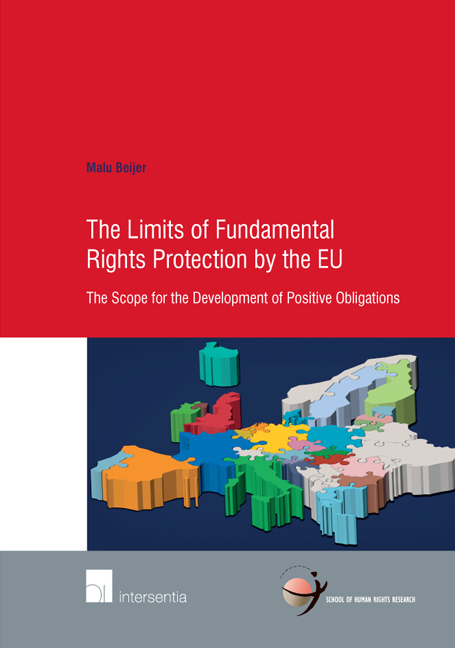 Limits of Fundamental Rights Protection by the EU
Limits of Fundamental Rights Protection by the EU Book contents
- Frontmatter
- About the Author
- Acknowledgements
- Contents
- Abbreviations
- Table of Cases
- Chapter 1 Introduction
- PART I THE CONCEPT OF POSITIVE OBLIGATIONS WITHIN THE CONTEXT OF THE EUROPEAN CONVENTION ON HUMAN RIGHTS
- Chapter 2 The System of Fundamental Rights Protection Under the European Convention on Human Rights
- Chapter 3 The Development of Positive Obligations Under the European Convention on Human Rights
- Chapter 4 A Critical Appraisal of the Development of Positive Obligations Under the European Convention on Human Rights
- Chapter 5 Part I – Conclusions
- PART II THE SCOPE FOR THE DEVELOPMENT OF POSITIVE OBLIGATIONS WITHIN THE CONTEXT OF EU LAW – AN ANALYSIS OF THE SPECIFIC PARAMETERS OF THE EU LEGAL ORDER AND THE EU SYSTEM OF FUNDAMENTAL RIGHTS PROTECTION
- PART III SYNTHESIS
- Bibliography
- Index
- Miscellaneous Endmatter
Chapter 4 - A Critical Appraisal of the Development of Positive Obligations Under the European Convention on Human Rights
from PART I - THE CONCEPT OF POSITIVE OBLIGATIONS WITHIN THE CONTEXT OF THE EUROPEAN CONVENTION ON HUMAN RIGHTS
Published online by Cambridge University Press: 27 September 2018
- Frontmatter
- About the Author
- Acknowledgements
- Contents
- Abbreviations
- Table of Cases
- Chapter 1 Introduction
- PART I THE CONCEPT OF POSITIVE OBLIGATIONS WITHIN THE CONTEXT OF THE EUROPEAN CONVENTION ON HUMAN RIGHTS
- Chapter 2 The System of Fundamental Rights Protection Under the European Convention on Human Rights
- Chapter 3 The Development of Positive Obligations Under the European Convention on Human Rights
- Chapter 4 A Critical Appraisal of the Development of Positive Obligations Under the European Convention on Human Rights
- Chapter 5 Part I – Conclusions
- PART II THE SCOPE FOR THE DEVELOPMENT OF POSITIVE OBLIGATIONS WITHIN THE CONTEXT OF EU LAW – AN ANALYSIS OF THE SPECIFIC PARAMETERS OF THE EU LEGAL ORDER AND THE EU SYSTEM OF FUNDAMENTAL RIGHTS PROTECTION
- PART III SYNTHESIS
- Bibliography
- Index
- Miscellaneous Endmatter
Summary
INTRODUCTION
The concept of positive obligations has become a familiar concept in the case-law of the ECtHR. In its judgments the ECtHR reconfirms and refines particular positive obligations which it has established in the past and also continues to develop new obligations. Nevertheless, the concept of positive obligations and the Court ‘ s case-law on positive obligations have remained controversial. Various points of criticism have been expressed by scholars, as well as by judges of the ECtHR. This chapter discusses that there is a certain amount of controversy over the very idea of inferring positive obligations from fundamental rights (section 4.2.). The Convention in particular is considered to leave no room for the implication of such obligations. Further, there are some who are critical of the far-reaching effects that positive obligations impose on relations between individuals (section 4.3.). Others find that the ECtHR, by determining the content of positive obligations, has entered the forbidden field of political decisionmaking, or that it has unduly created socio-economic obligations which had been deliberately excluded from the scope of the Convention by its draft ers (section 4.4.). Also, the supranational position of the ECtHR is considered to be problematic in that respect (section 4.5.). The positive obligations doctrine continues to be considered unpredictable and incoherent and it has been criticised for its lack of well-defined limits (section 4.6.). Lastly, the methodological choices which the ECtHR has made in the development and application of positive obligations have met with considerable disapproval (section 4.7.). These critiques of the positive obligations doctrine need to be discussed, as they would need to be evaluated and taken into account if the ECJ were to incorporate and develop a doctrine of positive obligations on its own. This chapter also considers, throughout the different sections, how such criticism can be dealt with. The main points of attention for developing a doctrine of positive obligations are brought together in the conclusions (section 4.8.).
ARE POSITIVE OBLIGATIONS INHERENT IN FUNDAMENTAL RIGHTS PROTECTION?
There are three types of criticism which have been expressed with respect to the Court ‘ s view that positive obligations are inherent to fundamental rights.
- Type
- Chapter
- Information
- Limits of Fundamental Rights Protection by the EUThe Scope for the Development of Positive Obligations, pp. 71 - 98Publisher: IntersentiaPrint publication year: 2017
